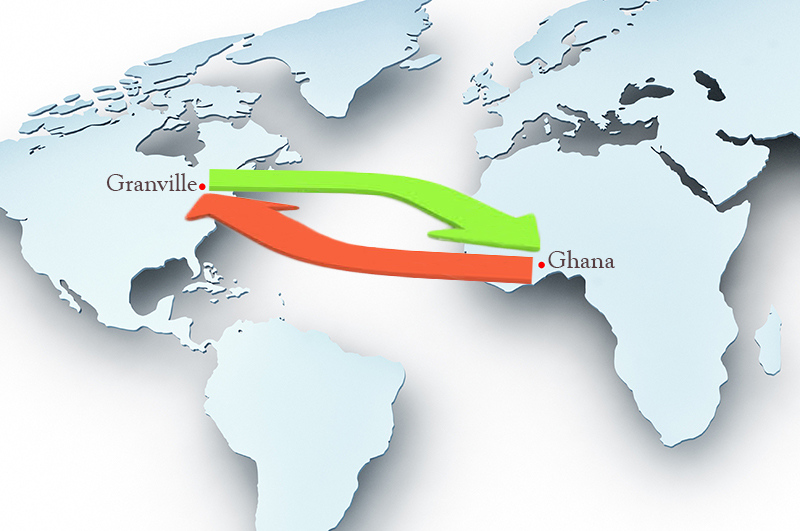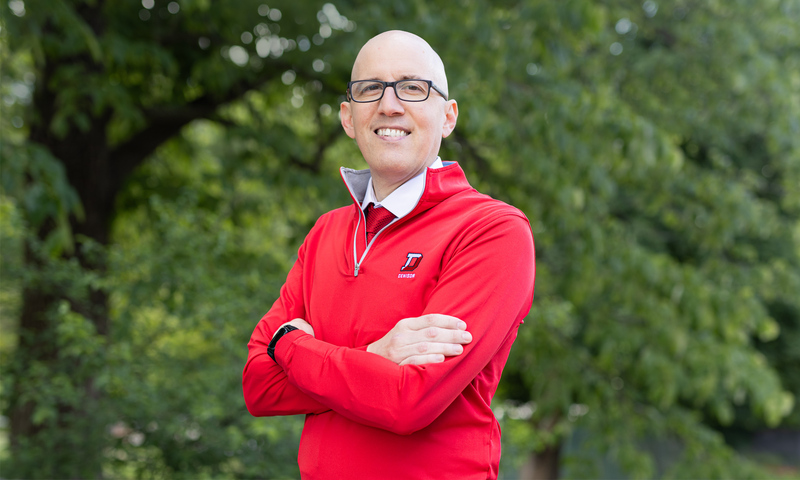Denison's emphasis on global perspective encourages opportunities abroad for students, and it also brings the world to Denison by building relationships with faculty and institutions in other countries. In the spring of 2016, the provost of Ashesi University in Ghana visited Denison and met with Sue Davis, Director of Off-Campus Study and International Programs, to talk about ways to deepen the relationship between the two institutions, both of which are members of the Global Liberal Arts Alliance (GLAA). GLAA is a consortium of 29 sister colleges in 17 countries working to strengthen liberal arts practices and values worldwide.
Ashesi University Economics Professor, Stephen Armah, happened to be looking for a sabbatical opportunity for the fall semester of 2016. “I wanted to be associated with a university that has a strong economics department — it’s good to bounce your ideas off your peers,” Armah recalled.
Armah's sabbatical plans and Denison's economics department were a winning fit. As a specialist in the economic development of African countries, Armah could contribute in a number of ways to Denison's community, and the reputation of Denison's economics department convinced Armah it would be a productive location for his research, which included education in Ghana, culture and corruption, and eldercare.
He also valued the ready-made community of related disciplines: “As a liberal arts school with an anthropology department, political science, ecology, African studies and economics, I have a rich set of people [at Denison] that I can collaborate with.”
That summer, three Denison professors visited Ashesi for a week to further build ties between the two institutions: Jessen Havill (computer science and data analytics), Veerendra Lele (anthropology/sociology), and May Mei (math). Professor Armah arrived in Granville from Ghana for the fall semester soon after their return.
Armah’s time at Denison wasn't his first experience in the United States or with liberal arts learning. He received his undergraduate degree in engineering from Swarthmore College, a master’s in economics from Emory University and a doctorate in agricultural economics from the University of Illinois at Urbana-Champaign.
“At that time, economics was very insular. Nobody really cared about development, especially what I was interested in, which was understanding cocoa and cash crops and how they contribute to the economy,” Armah points out. “My country then was heavily into developing cocoa.”
“We [in Ghana] need to ensure the quality of our academics. So I need to learn from a school that has done this. I need to see how it works.”
Returning home to Ghana after his American education to care for his parents, Armah began teaching at Ashesi University, which was founded in 2002. “Ashesi [which means “beginning”] was — and still is — the only liberal arts college in Ghana. I was educated at liberal arts schools, I know how they're run. So I can really contribute here.”
Professor and Chair of Economics at Denison, Andrea Ziegert, looks back at Armah's contributions during his semester here: “We learned about the complications that corruption brings to economic development in Africa through the research Stephen shared. And our discussions of curriculum have led us to develop a joint economic development course with Ashesi and Denison students.”
As often happens in a close community, he shared from life experience as well as from academic knowledge — Ziegert recalled a department meeting where there was a conversation about diversity in the economics profession, including in the classroom. “[Armah] shared his experience of what it was like to always be the only black person in his graduate studies. He was very willing to use that experience to help us think about how we could make our classrooms better learning environments.”
Armah was also a guest speaker in a Latin American Economic Development course led by Assistant Professor Luis Villanueva. “My students enjoyed and shared very positive comments about Stephen’s lecture on foreign aid in Sub-Saharan African countries,” he said. “His lecture helped my students to gain a broader perspective on issues faced by developing countries.”
Now home again in Ghana, Armah is a senior lecturer in the business administration department at Ashesi. But the door is open for continuing research opportunities with Denison, as well as summer research collaborations, faculty exchange programs and off-campus study with both schools.
Armah and his Denison colleague, Luis Villanueva, are planning a discussion-based, collaborative class that will be taught at Ashesi and Denison in the fall of 2017. “Sessions will be recorded and exchanged, and then at the end, students will write response papers that have to incorporate culture from both mediums to make sure that students actually understand the issues at hand,” said Armah.
And a new research focus has emerged from their collaboration. “We're both specialists in economic development, I specialize in Latin American countries and Stephen in African countries,” said Villanueva. “Stephen and I are currently working on a joint project exploring the reason behind the low economic growth in Mexico and Ghana, two developing countries that have pursued the export-led development strategy since the 1980s but have experienced very low economic growth.”

